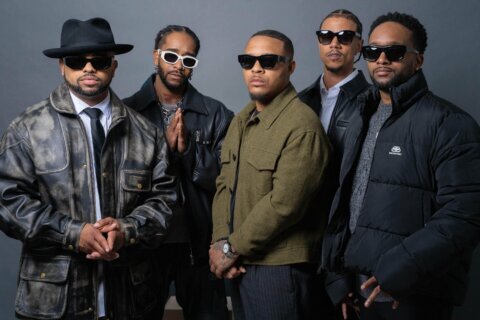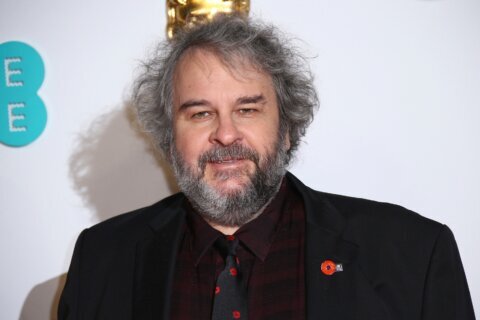WASHINGTON — Her voice has promoted female empowerment for years, whether it’s performing Destiny’s Child hits like “Independent Women Part 1” or joining Beyoncé on stage to perform “Single Ladies” at the Super Bowl in 2013.
Now, Michelle Williams is empowering women in a new way, serving as the official ambassador of the 18th annual National Women’s Health Week, which kicked off on Mother’s Day and runs through Saturday, organized by the U.S. Department of Health & Human Services’ Office on Women’s Health.
“This is something we’ve been working on since last year, so I could not wait for this day to come,” Williams told WTOP. “The goal of Women’s Heath Week is for women to make their health a priority and encourage them to take some simple steps for their health. … Avoiding unhealthy behaviors like smoking, texting while driving, or making sure you wear a seat belt, being active and eating healthy.”
Williams says too many women put exercise on a daunting pedestal.
“People think working out is such a huge task,” William said. “I’ve learned to cope with [stress] by adding exercise to my daily regimen. I have an accountability partner, so if I don’t work out, I have to pay her $25 for each session that I miss. Because I don’t wanna pay that money, I go and work out!”
She also encourages regular “well-woman visits” to the doctor.
“It’s a good time to do things like getting your blood pressure checked,” Williams said. “Even if you work out every day, if you’re not eating healthy, you want to find out, ‘OK, what are my cholesterol levels?’ Unless you’re eating kale every day, which most of us aren’t, we have to get our screenings.”
These preventative screenings can save your life.
“My mother is with me today because she got her mammograms when she was supposed to,” Williams said. “They detected Stage 1 of breast cancer, and she’s been with me since; it’s been in remission. … Get your annual checkups, your Pap smears, your STD screenings, your HIV tests — anything that you know you can test for to make sure that you’re as healthy as you can be.”
In addition to physical fitness, the initiative has placed a growing emphasis on mental health.
“Your mental health is so important and it’s something that we neglect,” Williams said. “Mental health is particularly important for me because I’ve experienced depression. I believe you can have a healthy body if you take care of your mind. For me, I’ve been noticing that if I’m not strong mentally, I’m not strong physically. I don’t want to work, I don’t want to get out of bed, I don’t want to do anything!”
Part of the struggle is overcoming the taboo nature of seeking mental health assistance.
“I’ve been open about my depression,” she said. “I sought help from my loved ones, but I also sought professional help by seeking therapy. I want people to know it’s OK to talk about mental health and it’s OK to seek help. What is not OK is you walking around knowing something is wrong, knowing you can’t get out of this sadness, but you’re not doing anything about it. … I just want you to know: You don’t have to feel hopeless, you’re not alone, I’m with you, I’m on the same journey as you are.”
Williams says her depression began as a teenager growing up in Rockford, Illinois, in the 1980s.
“I started suffering with depression around age 12 or 13,” she said. “At that age, I didn’t know what it was; I just thought it was growing pains. I thought I would just isolate myself and just be withdrawn, because I thought that’s what an early teenager does. I thought, ‘Oh, I’m going through the change of puberty.’ As I look back, that’s what I thought it was, but I didn’t know it was actually depression.”
Managing her depression, Williams passed an audition in May 1999 to become a backup singer for Grammy winner Monica, touring with her through October and catching the eye of Destiny’s Child.
“I tell children all the time: How you treat others will determine your destiny,” she said. “A dancer that was dancing with Monica was off with Destiny’s Child’s choreographer. I remember her telling them when they were in the process of looking for a new member: ‘You might want to check out Michelle.’ Your work ethic and how you treat people will always get you a reference and that’s what happened.”
Destiny’s Child had already landed R&B hits — “No, No, No” (1997), “Bills, Bills, Bills” (1999), “Say My Name” (2000), “Jumpin’ Jumpin’ (2000) — when Williams joined Beyoncé Knowles and Kelly Rowland to form the trio’s most well-known lineup, finding another hit in “Independent Women Pt. 1” (2000).
“‘Independent Women’ was the first song that I was actually audibly on the song,” she said. “I’ll never forget, I was in L.A. when I first heard that song on the radio and I just went absolutely bonkers.”
More hits followed: “Survivor” (2001), “Bootylicious” (2001), “Emotion” (2001), “Lose My Breath” (2004) and “Soldier” (2004). In 2006, Destiny’s Child received a star on the Hollywood Walk of Fame and gave a farewell performance at the 2006 NBA All-Star Game. While officially disbanding the trio, they continued to collaborate on each other’s solo projects, as Williams shifted into a gospel singer.
These experiences gave Williams a new perspective, which she now wants to share with others.
“Now, I’m an older woman and I get to talk about my health [by] correlating it back to being in a girls’ group,” she said. “We were always working out, making sure we were there for each other, and that’s what I want women to do. Make sure you’re working out and you’re there for your other friends and families and make sure that you have another woman in your life, holding each other accountable.”
Click here for more on National Women’s Health Week. Listen to the full chat with Michelle Williams below:








